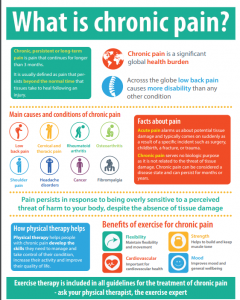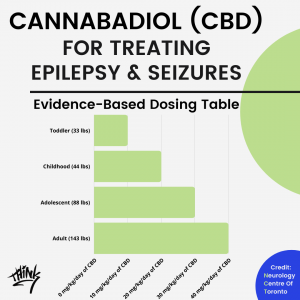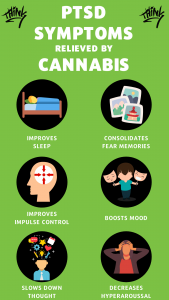Montana Medical Marijuana: What Are The Most Common Conditions?
Since Montana launched its medical marijuana program almost two decades ago, more than 35,000 Montana residents have signed up as registered patients.

A steadily growing number of folks are discovering that medical cannabis can help them live full lives despite the serious medical issues they may face.
Here, we’ll explore how cannabis works for some of the most common conditions patients are approved for in Montana.
Approved conditions in the Montana medical marijuana program
In Montana, you can be approved for medical marijuana for a number of debilitating conditions that severely impact your quality of life.
According to the Montana Department of Health, the following conditions are approved in 2020:
- Cancer (either side effects from treatment or cancer pain)
- Glaucoma
- HIV/AIDS with symptoms that “seriously and adversely affect the patient’s health status”
- Cachexia/wasting syndrome
- Severe chronic pain
- “Severe chronic pain” is defined as “persistent pain of severe intensity that significantly interferes with daily activities.” This must be proven by your doctor and confirmed by a second doctor. You must also provide “objective proof of the etiology of the pain,” such as diagnostic tests, x-rays, MRIs, current prescriptions or other documentation
- Intractable (cannot be controlled by other treatments) nausea or vomiting
- Epilepsy or another intractable seizure disorder
- Multiple sclerosis (MS)
- Crohn’s disease
- Painful peripheral neuropathy
- A central nervous system disorder resulting in chronic, painful spasticity or muscle spasms
- Admittance into hospice
- Post-traumatic stress disorder (PTSD)
The Montana state legislature adds new conditions, so check with Think Higher Caregiving or the Montana Department of Health for the most updated list.
How cannabis helps common conditions
While there are more than a dozen approved conditions in Montana’s medical marijuana programs, a handful of these eligible diagnoses make up the lion’s share of recommendations made in the state.
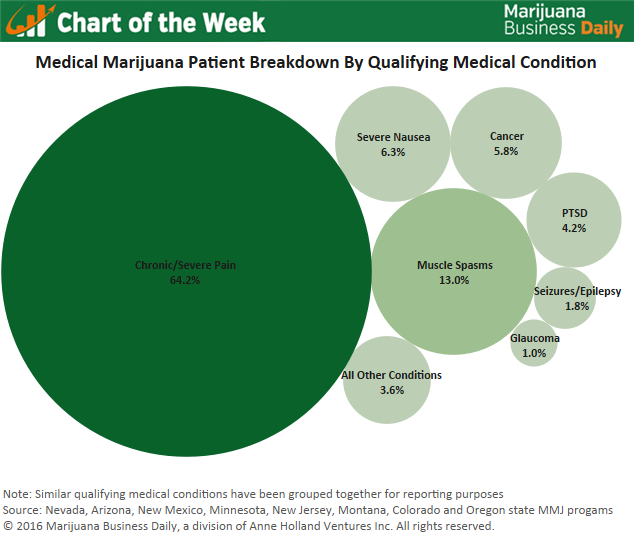
Here are some of the most frequent conditions Think Higher Caregiving patients address with cannabis, how cannabis helps those conditions, and which products from the dispensary are best for each so patients can regain their quality of life.
Crohn’s Disease
Crohn’s disease is a chronic inflammatory bowel disease (IBD) which affects the digestive tract lining. Studies have shown that cannabis can improve symptoms associated with IBDs, including pain and loss of appetite.

This makes Delta-8 THC an excellent option for those with Crohn’s disease. Think Higher Caregiving is one of the first Montana medical marijuana providers to offer Delta-8 THC products.
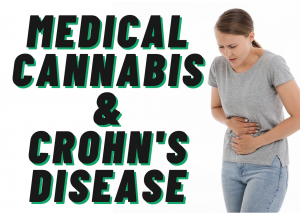
Some studies highlight that subjects stopped trials early due to the psychoactive effects caused by Delta-9 THC, the best-known phytocannabinoid in cannabis and the one that causes the infamous cannabis high. Delta-8 THC, which is Delta-9 THC’s much less psychotropic cousin, also stimulates appetite, reduces vomiting, and has pain-relieving properties.
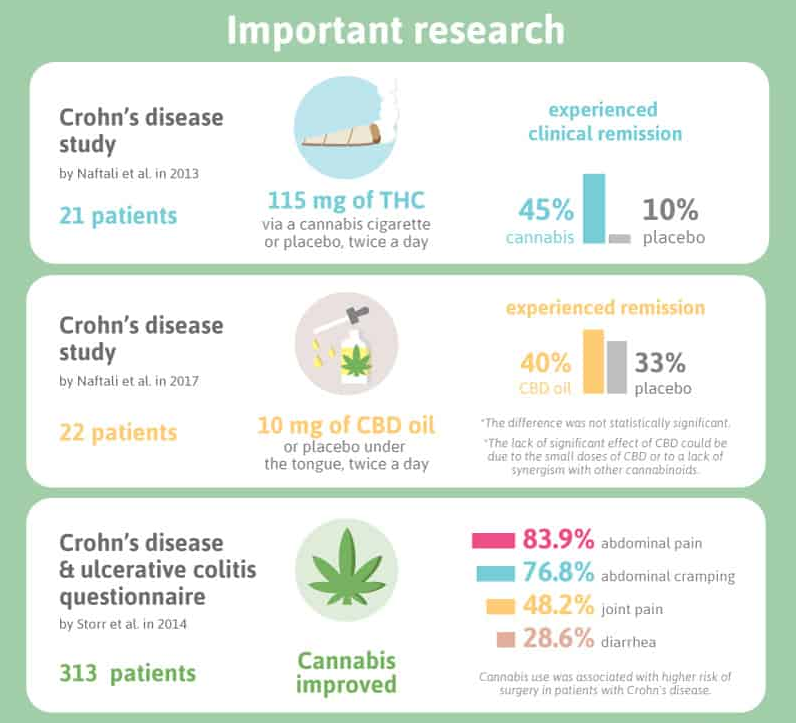

Thanks to cannabis, many chronic pain patients can regain a sense of normalcy, utilizing a medicine that doesn’t cause a “zombie-like” grogginess or come with a high risk for addiction.
Phytocannabinoids from cannabis supplement your body’s natural but limited supply of endocannabinoids, which are compounds that interact with your body’s endocannabinoid system to help keep you feeling balanced and at ease.
Cannabinoids work by rushing to the site of pain, interacting with the endocannabinoid receptors in that area and working to calm down the cause of pain there.
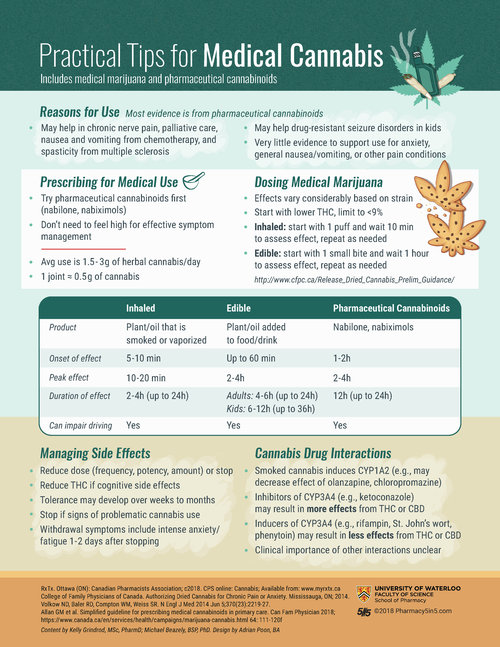
Chronic Pain
As any patient can tell you, chronic pain can derail your life. Severe or intractable pain keeps sufferers from living life to the fullest, forcing patients to sit on the sidelines instead of going to work, running errands, or enjoying time with friends and family.
Chronic pain can be caused by a number of factors, including an injury or a symptom of a medical condition.
The best cannabis products for chronic pain depends on the type of pain, your diagnosis, where the pain originates, and how the pain behaves.
For example, a topical is best for localized pain due to an injury, while an ingestible would be better for widespread pain caused by a medical condition like MS.
You may also want to consider a strain or product high in the terpene beta-caryophyllene, which has been observed to behave like a cannabinoid by activating the endocannabinoid system’s CB2 receptors. This terpene is being researched for the role it can play in pain relief.
Cancer
Cancer symptoms and side effects stem from two separate sources: cancer itself and the brutal toll cancer treatments take on your body.
Cancer pain is its own unique category, often caused by tumors pressing against nerves, bones, and organs.

Speak with your doctor and bring your doctor’s recommendations with you to your Think Higher Caregiving appointment. If you need advice on how to discuss your medical conditions with your doctor and how cannabis could relate to them, Think Higher Caregiving is available to offer support.
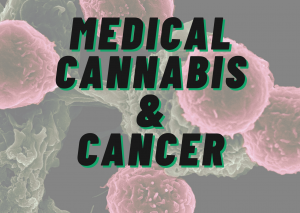
You may also experience pain due to any surgeries you had to treat cancer, as well as chemotherapy or radiation’s toll on your body.
You may also experience anxiety, nausea, vomiting, and a loss of appetite due to cancer.
The cannabis products best for cancer wholly depend on your diagnosis, symptoms, and treatment.
If you’re having trouble sleeping because of the pain, we may recommend an ingestible like edibles or capsules because they spend several hours in your system, helping you stay asleep.
If treatment makes you anxious, you may want to inhale flower or dab so you can feel the effects within a few minutes, but we would not recommend that a lung cancer patient inhales their medicine.

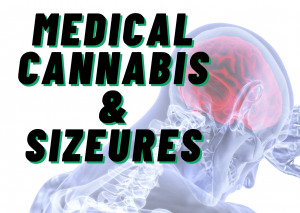
There is significant evidence that phytocannabinoids, particularly THC and CBD, could act as anticonvulsants, helping to alleviate the seizures associated with epilepsy.
In fact, the U.S. Food and Drug Administration (FDA) approved an anti-seizure medication called Epidiolex, which contains CBD as a primary ingredient.
It was the first (and remains the only) FDA approved pharmaceutical product that contains a phytocannabinoid.
Epilepsy
Epilepsy is a neurological condition characterized by seizures and unusual sensations, such as strange smells, and behaviors. Epilepsy can be a lifelong condition with no known cure, often significantly disrupting the lives of people living with the condition.

However, non-pharmaceutical phytocannabinoids could help reduce the risk of seizures as well. Both animal and human studies have demonstrated the neuroprotective properties of cannabinoids like THC and CBD, including one study that found CBD and CBDV were especially effective at acting as anticonvulsants.
Post-Traumatic Stress Disorder (PTSD)
PTSD develops following a traumatic experience and is closely linked to the way a person processes emotions associated with certain memories.
PTSD affects people from many different backgrounds, such as combat veterans, people who experienced abuse, and people who survived a major accident or disaster.
The emotional memory processing associated with the traumatic events often causes a person living with PTSD to regularly re-experience the event in their mind, often referred to as flashbacks.
PTSD can also cause difficulty sleeping and prompt excessive avoidance of any stimuli associated with the traumatic event. PTSD is commonly diagnosed alongside depression anxiety symptoms as well.
Cannabis has been found to ease certain symptoms of PTSD, including the tendency for people living with PTSD to self-harm following a flashback.
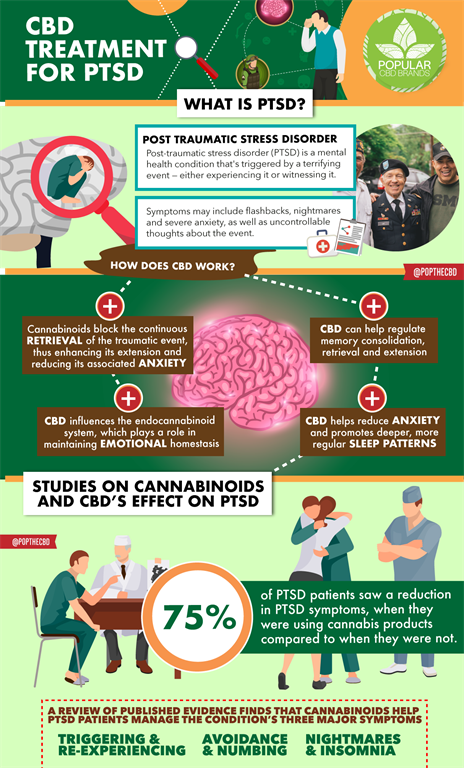
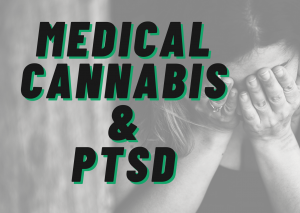
In one clinical case report, clinicians found a significant improvement in the condition of a PTSD patient after he began using a balanced THC/CBD cannabis resin.
Researchers suspect that cannabinoids are effective for the treatment of PTSD because of its interaction with the CB1 and CB2 receptors clustered in the area of the brain responsible for memory processing and consolidation.
Additionally, researchers have linked phytocannabinoids to the regulation of anxiety responses; PTSD is technically an anxiety disorder, causing people living with the condition to regularly re-experience stress, anxiety, and fear associated with their past trauma.
How to get your Montana medical marijuana card
Obtaining your medical marijuana card in Montana is a multi-step process requiring recommendation from a physician and registration with the Montana Department of Health.
Patients are allowed to buy up to 1 ounce of usable cannabis per visit, with a maximum purchase limit of 5 ounces each month. In certain circumstances, a registered cardholder with signed approval from a doctor, could exceed that monthly limit up to 8 ounces.

As of June 2020, any patient can visit any Montana medical marijuana dispensary. To learn more about how to obtain your medical marijuana card in Montana and the rules and requirements of the Montana medical marijuana program, visit the Think Higher Caregiving FAQ page.


